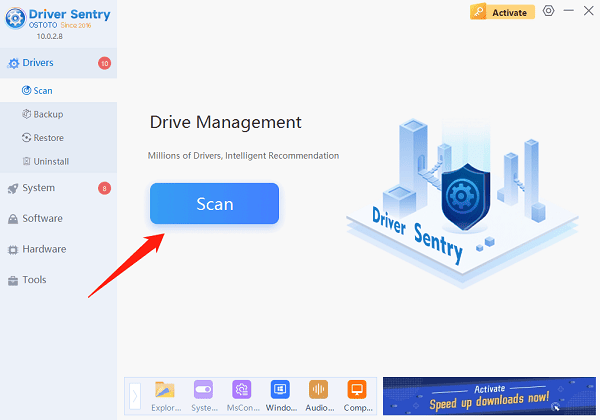
Some Windows users may experience game crashes while running Monster Hunter Wilds, affecting gameplay. This article provides several effective solutions to help players run the game smoothly.
1. Check Minimum System Requirements
OS: Windows® 10 (64-bit Required) / Windows® 11 (64-bit Required)
Processor: Intel® Core™ i5-10400 or Intel® Core™ i3-12100 or AMD Ryzen™ 5 3600
Memory: 16 GB RAM
Graphics: NVIDIA® GeForce® GTX 1660 (VRAM 6GB) or AMD Radeon™ RX 5500 XT (VRAM 8GB)
DirectX: Version 12
Network: Broadband Internet connection
Storage: 75 GB available space
Additional Notes: SSD required. This game is expected to run at 1080p (upscaled from 720p native resolution) / 30 FPS under the "Lowest" graphics setting. DirectStorage supported.
2. Check for Device Driver Updates
Outdated or corrupted drivers may cause system instability, leading to game crashes. Regularly updating device drivers can effectively resolve this issue. It is recommended to use Driver Sentry to automatically detect and update drivers, saving time and avoiding incorrect driver installations.
Click the download button to get the latest version of Driver Sentry. After installation, open the software and click "Scan".

Once the scan is complete, a list of missing or outdated drivers will be displayed. Locate the graphics driver and click the "Upgrade" button.
After updating, restart your computer to ensure the new driver functions properly.
3. Verify Game File Integrity
Open Steam and go to "Library".
Find Monster Hunter Wilds, right-click on the game title, and select "Properties".
In the left-side menu, click "Installed Files". Select "Verify integrity of game files".

Steam will automatically scan and repair any missing or corrupted files.
Once the process is complete, restart the game and check if the issue is resolved.
4. Run the Game as Administrator
Right-click on the game shortcut on the desktop and select "Properties".
In the "Compatibility" tab, check "Run this program as an administrator".

Click "Apply" → "OK".
Restart the game and check if the crash issue is resolved.
5. Increase Virtual Memory
Press Win + R, type "sysdm.cpl", and press Enter to open System Properties.
In the "Advanced" tab, locate "Performance" and click "Settings".
In the new window, switch to the "Advanced" tab.
Under the "Virtual Memory" section, click "Change".
Uncheck "Automatically manage paging file size for all drives".
Select your system drive (usually C:), then check "Custom Size".
Set the virtual memory size as follows:
Initial Size: 1.5 times your physical RAM size
Maximum Size: 3 times your physical RAM size

Click "Set" → "OK" → "Apply".
Restart your computer and then launch the game to check if the crash issue is resolved.
6. Reinstall the Game
Open Steam and go to "Library".
Right-click on Monster Hunter Wilds, select "Manage" → "Uninstall".
Confirm the uninstallation, then manually delete the remaining game files: C:\Program Files (x86)\Steam\steamapps\common\Monster Hunter Wilds\
Restart your computer, then download and install the game again.
Additional Recommendations:
When reinstalling, it is recommended to install the game on an SSD to reduce loading times and improve stability.
After installation, verify the game file integrity again to ensure all files are correctly downloaded.
By following these steps, you should be able to troubleshoot and resolve Monster Hunter Wilds crashing issues effectively. If the problem persists, consider checking the official support forums or community discussions for additional solutions.
See also:
Methods to Fix Slow Internet on Windows 10
Fix Intel Wireless-AC 9560 Not Working (Code 10)